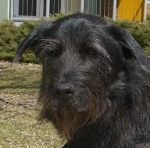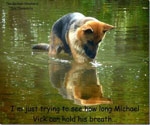What if you don't feel tired BEFORE treatment?
-
JTexas
What if you don't feel tired BEFORE treatment?
I'm 43 yr old woman, snore loudly since I was pregnant with my youngest 8 years ago. Apparently, it's gotten much worse.
I sleep 7 hours or so a night, do NOT feel tired, have good energy levels, etc., etc.
BUT, the snoring led to a sleep study and I had 21 episodes per hour.
I"m going to try the machine.
But why don't I feel tired if I have obstructive sleep apnea?
I sleep 7 hours or so a night, do NOT feel tired, have good energy levels, etc., etc.
BUT, the snoring led to a sleep study and I had 21 episodes per hour.
I"m going to try the machine.
But why don't I feel tired if I have obstructive sleep apnea?
Re: What if you don't feel tired BEFORE treatment?
I wasn't tired or sleepy but sleep study (I snored VERY loudly!) indicated an AHI of 108 but normal sleep stages...
According to my sleep doctor, I am a strange case. Glad to see I'm not alone
I suppose some people adapt to the lack of oxygen.
According to my sleep doctor, I am a strange case. Glad to see I'm not alone
I suppose some people adapt to the lack of oxygen.
_________________
| Machine: PR System One REMStar 60 Series Auto CPAP Machine |
| Mask: Zest Q Nasal CPAP Mask with Headgear |
| Additional Comments: FR568S version with "P-Flex". |
Re: What if you don't feel tired BEFORE treatment?
Maybe you're one of those people who can get by on less quality sleep. Maybe you've been able to adapt to less sleep.
But, your body can only adapt up to a point. Even if you don't feel tired, you could still be doing damage to your cardiovascular system, putting you at increased risk of high blood pressure, heart problems, stroke...
So, if for no other reason, use the machine to keep yourself healthy so you can be around for your kids for many years to come.
You might also find that you were not adapting as well as you thought. A lot of people get used to a certain level of tiredness and don't notice it after a while. But maybe after a few weeks on the machine you'll feel even better.
But, your body can only adapt up to a point. Even if you don't feel tired, you could still be doing damage to your cardiovascular system, putting you at increased risk of high blood pressure, heart problems, stroke...
So, if for no other reason, use the machine to keep yourself healthy so you can be around for your kids for many years to come.
You might also find that you were not adapting as well as you thought. A lot of people get used to a certain level of tiredness and don't notice it after a while. But maybe after a few weeks on the machine you'll feel even better.
Re: What if you don't feel tired BEFORE treatment?
Because you are lucky. Not everyone presents with the commonly seen symptoms. Count yourself very lucky that you have caught this early and have a chance to nip it in the bud and prevent further damage or prevent some of the commonly seen symptoms. You are young. Count yourself lucky that now you have a chance to really enjoy your child and future grandchildren by preventing those commonly seen symptoms from ever messing with your life.JTexas wrote:But why don't I feel tired if I have obstructive sleep apnea?
_________________
| Machine: AirCurve™ 10 VAuto BiLevel Machine with HumidAir™ Heated Humidifier |
| Additional Comments: Mask Bleep Eclipse https://bleepsleep.com/the-eclipse/ |
I may have to RISE but I refuse to SHINE.
Re: What if you don't feel tired BEFORE treatment?
I was also one who did not feel tired before my diagnosis and my doctor said my body had learned to adapt to the interrupted sleep. After I finally got my mask situation worked out I did notice a better feeling and I had what my doctor called critical sleep apnea. I had 55 episodes per hour before the machine and .6 afterwards but I have not noticed a huge spike in energy level. My peace of mind has improved greatly though!
_________________
| Mask: Swift™ FX Bella Nasal Pillow CPAP Mask with Headgears |
| Humidifier: S9™ Series H5i™ Heated Humidifier with Climate Control |
Re: What if you don't feel tired BEFORE treatment?
JTexas,
At your age, and with minimal symptoms, I also would question things. How did the sleep study go? Did you sleep good? Did you have to sleep in a different position then you normally sleep?
I'm 63 and have been on cpap for about 6 months. I didn't have any major symptoms either. No morning headaches, I'd occasionally be tired and take a nap or drink a cup of coffee and be OK. I did/do have high blood pressure though.
You don't have to blindly accept the fact that you will now have to sleep with cpap for the rest of your life...which could easily be the next 40 years. Apnea tend to be positional...worse during back sleeping. Weight loss can improve things. There is some medical evidence that improved vitamin D3 levels can help. Exercise can improve the situation...end especially exercise aimed at the mouth and throat area. Playing a woodwind instrument, or singing. There also are non-cpap options such as a dental appliance and surgery.
You're at the range of mild to moderate apnea. With serious effort, it could be possible to improve your situation. Or like I hinted, the sleep study possibly didn't reflect your true situation.
Since CPAP is being recommended for you now, for safety sake, give it an honest effort. But also educate yourself and do some serious work and at some point down the road, repeat the sleep study. That's the approach that I'm taking.
Cheers,
Jamis
PS: My PSG also showed an AHI of 21
At your age, and with minimal symptoms, I also would question things. How did the sleep study go? Did you sleep good? Did you have to sleep in a different position then you normally sleep?
I'm 63 and have been on cpap for about 6 months. I didn't have any major symptoms either. No morning headaches, I'd occasionally be tired and take a nap or drink a cup of coffee and be OK. I did/do have high blood pressure though.
You don't have to blindly accept the fact that you will now have to sleep with cpap for the rest of your life...which could easily be the next 40 years. Apnea tend to be positional...worse during back sleeping. Weight loss can improve things. There is some medical evidence that improved vitamin D3 levels can help. Exercise can improve the situation...end especially exercise aimed at the mouth and throat area. Playing a woodwind instrument, or singing. There also are non-cpap options such as a dental appliance and surgery.
You're at the range of mild to moderate apnea. With serious effort, it could be possible to improve your situation. Or like I hinted, the sleep study possibly didn't reflect your true situation.
Since CPAP is being recommended for you now, for safety sake, give it an honest effort. But also educate yourself and do some serious work and at some point down the road, repeat the sleep study. That's the approach that I'm taking.
Cheers,
Jamis
PS: My PSG also showed an AHI of 21
- Kairosgrammy
- Posts: 529
- Joined: Mon Jan 02, 2012 8:13 am
Re: What if you don't feel tired BEFORE treatment?
You may be surprised. I knew I was tired a lot but never really thought much about it. Turned out, once I started cpap therapy, the sleepiness etc. I'd written off as just normal was actually due to apnea. I truly didn't know how bad I felt til I felt better.
JTexas wrote:I'm 43 yr old woman, snore loudly since I was pregnant with my youngest 8 years ago. Apparently, it's gotten much worse.
I sleep 7 hours or so a night, do NOT feel tired, have good energy levels, etc., etc.
BUT, the snoring led to a sleep study and I had 21 episodes per hour.
I"m going to try the machine.
But why don't I feel tired if I have obstructive sleep apnea?
_________________
| Mask: Swift™ FX For Her Nasal Pillow CPAP Mask with Headgear |
| Additional Comments: I'm starting to use sleepyhead. |
Re: What if you don't feel tired BEFORE treatment?
Even if you feel nothing, it's likely that apnea is doing long term damage to your body. O2 deprivation damages the heart, brain, and other organs. Your brain reacts to being strangled with stress, which screws up your hormones and does bad things to your organs. Lack of quality sleep screws up the brain.
It's like the fable of boiling a frog slowly.
It can also be like aging faster.
Apnea also tends to get worse, not better, as we age, even for a youngster like you.
Even if you say you're not tired, is that really true? We all have a certain energy level. Maybe yours would be better with CPAP. Lots of people who do CPAP find that they have more energy later.
I don't want to oversell CPAP. I'm mainly pointing out that not feeling tired doesn't mean you don't have a serious medical problem.
It's like the fable of boiling a frog slowly.
It can also be like aging faster.
Apnea also tends to get worse, not better, as we age, even for a youngster like you.
Even if you say you're not tired, is that really true? We all have a certain energy level. Maybe yours would be better with CPAP. Lots of people who do CPAP find that they have more energy later.
I don't want to oversell CPAP. I'm mainly pointing out that not feeling tired doesn't mean you don't have a serious medical problem.
_________________
| Mask: Swift™ FX Nasal Pillow CPAP Mask with Headgear |
| Humidifier: S9™ Series H5i™ Heated Humidifier with Climate Control |
| Additional Comments: Also SleepyHead, PRS1 Auto, Respironics Auto M series, Legacy Auto, and Legacy Plus |
Please enter your equipment in your profile so we can help you.
Click here for information on the most common alternative to CPAP.
If it's midnight and a DME tells you it's dark outside, go and check for yourself.
Useful Links.
Click here for information on the most common alternative to CPAP.
If it's midnight and a DME tells you it's dark outside, go and check for yourself.
Useful Links.
- Corkster52
- Posts: 47
- Joined: Sun Jan 15, 2012 8:42 am
- Location: Perrysburg OH
Re: What if you don't feel tired BEFORE treatment?
I have never really felt tired, but I drive myself pretty hard. The wife says I am tired quite often though...hmmm. Just picked my S9 autoset today, so will see how things go. One thing I am looking forward to seeing is if there is a difference in performance on my daily 5K row on my rowing machine. Some days it is a real chore, while others seem to fly by. We shall see.....
_________________
| Mask: Quattro™ FX Full Face CPAP Mask with Headgear |
| Humidifier: S9™ Series H5i™ Heated Humidifier with Climate Control |
| Additional Comments: Also trying SleepyHead |
Re: What if you don't feel tired BEFORE treatment?
What if you don't feel tired before treatment? Hmmmm......that's a great question.
If you don't feel tired, that's great....for now. My guess is your body is doing a fine job of compensating for the lack of oxygen.
I agree with Archangle. In my view, Sleep Apnea is an improperly named condition. I think it should be 'nighttime suffocation syndrome' or something like that. I like Archangles term "strangulation", that might wake more people up (pun intended) to the seriousness of the condition.
Sleep apnea is more about 'not breathing' than it is about not sleeping. Sadly when people hear the term 'sleep apnea', their focus is on the word 'sleep'...when it should be on the word 'apnea'. Apnea means "temporary absence or cessation of breathing." I call it suffocation. If you have 21 episodes per hour, that means that 21 times per hour you are not breathing for 10 or more seconds. If your apneas are a minute each, that means you are suffocating for 21 minutes per hour, give or take a few minutes. In an eight hour night, that means 2 hours and 48 minutes per night of being gagged.
In your case, your body may be strong enough right now to compensate for the suffocation. You're heart is working overtime to make up for the lack of oxygen, kinda like an engine being revved up to the red zone at 7000 or 8000 RPM's. It works just fine for a little while until the engine blows.
So, I hope you don't let feeling good stop you from using your machine. It could be that one day you will feel the effects, and by that time it may be too late to reverse some of the damage that oxygen deprivation has done to you.
Good luck!
If you don't feel tired, that's great....for now. My guess is your body is doing a fine job of compensating for the lack of oxygen.
I agree with Archangle. In my view, Sleep Apnea is an improperly named condition. I think it should be 'nighttime suffocation syndrome' or something like that. I like Archangles term "strangulation", that might wake more people up (pun intended) to the seriousness of the condition.
Sleep apnea is more about 'not breathing' than it is about not sleeping. Sadly when people hear the term 'sleep apnea', their focus is on the word 'sleep'...when it should be on the word 'apnea'. Apnea means "temporary absence or cessation of breathing." I call it suffocation. If you have 21 episodes per hour, that means that 21 times per hour you are not breathing for 10 or more seconds. If your apneas are a minute each, that means you are suffocating for 21 minutes per hour, give or take a few minutes. In an eight hour night, that means 2 hours and 48 minutes per night of being gagged.
In your case, your body may be strong enough right now to compensate for the suffocation. You're heart is working overtime to make up for the lack of oxygen, kinda like an engine being revved up to the red zone at 7000 or 8000 RPM's. It works just fine for a little while until the engine blows.
So, I hope you don't let feeling good stop you from using your machine. It could be that one day you will feel the effects, and by that time it may be too late to reverse some of the damage that oxygen deprivation has done to you.
Good luck!
Thinking of quitting CPAP?
No problem, here's the first thing to do when you quit:
Advanced funeral planning. When you give up CPAP, you'll probably need it.
No problem, here's the first thing to do when you quit:
Advanced funeral planning. When you give up CPAP, you'll probably need it.
Re: What if you don't feel tired BEFORE treatment?
If bad breathing does not lead to significantly bad blood-gas levels or to significantly bad sleep or to any symptoms, there may seem to be no reason to treat the bad breathing. Yet. But if your AHI is over 20 or so, most informed docs would want to treat that regardless of how you feel.
OSA is often a progressive problem in which the body adapts to its nightly circumstances in an attempt to normalize its processes. Some people's body can be better at that than other people's. But as that progresses, eventually a person's body has to choose between good blood-gas and good sleep, since it can't usually have both with bad breathing all night. It may choose good sleep by ignoring blood-gas troubles (such as low O2 or high CO2), but that will damage health over time. Or it may choose good blood-gas by disrupting its own sleep all night to keep itself out of a stage that it breathes badly in. Bad sleep can kill over time. Humans need sleep. If the problem progresses further, you get a body that can't maintain O2 OR sleep, and then it all starts to get really ugly in a real hurry.
It can be difficult to be good judges of our own sleepiness and tiredness, since we tend to judge things comparatively. Do I feel better or worse than yesterday? last week? last month? If we tend to feel the same every day, we have nothing to compare it to. Some after months of successful treatment of bad sleep-breathing do notice the difference over time, but for others, if the improvement is gradual, the change is less dramatic and thus less noticeable to them.
That said, treatment is to fix a problem. If you feel great (as in no problems with tiredness or sleepiness), have good blood-gas all night, have normal sleep staging, AND have some non-PAP way to keep your AHI below 20 or so, there may be little or no reason to use PAP therapy. The over-five rule with OSA applies only to those who have symptoms. If you have no symptoms, the over-20-AHI (some docs may use 15 or 25, I think) is the rule that would apply, as far as standard practice, I believe.
Something to research, though, is all the data that show that snoring alone is bad for health, even when it doesn't involve, or lead to, OSA. That alone may be a reason to accept PAP therapy if it is offered.
Something to consider, too, is how some have said that if they magically no longer snored or no longer had any significant, measurable breathing problems, they would still choose to use PAP therapy in order to get the custom-humidified, filtered air delivered to them all night--it helps their overall comfort in life and decreases allergy trouble and related sinus problems that custom-humidified, filtered air directly to the nose solves for them.
OSA is often a progressive problem in which the body adapts to its nightly circumstances in an attempt to normalize its processes. Some people's body can be better at that than other people's. But as that progresses, eventually a person's body has to choose between good blood-gas and good sleep, since it can't usually have both with bad breathing all night. It may choose good sleep by ignoring blood-gas troubles (such as low O2 or high CO2), but that will damage health over time. Or it may choose good blood-gas by disrupting its own sleep all night to keep itself out of a stage that it breathes badly in. Bad sleep can kill over time. Humans need sleep. If the problem progresses further, you get a body that can't maintain O2 OR sleep, and then it all starts to get really ugly in a real hurry.
It can be difficult to be good judges of our own sleepiness and tiredness, since we tend to judge things comparatively. Do I feel better or worse than yesterday? last week? last month? If we tend to feel the same every day, we have nothing to compare it to. Some after months of successful treatment of bad sleep-breathing do notice the difference over time, but for others, if the improvement is gradual, the change is less dramatic and thus less noticeable to them.
That said, treatment is to fix a problem. If you feel great (as in no problems with tiredness or sleepiness), have good blood-gas all night, have normal sleep staging, AND have some non-PAP way to keep your AHI below 20 or so, there may be little or no reason to use PAP therapy. The over-five rule with OSA applies only to those who have symptoms. If you have no symptoms, the over-20-AHI (some docs may use 15 or 25, I think) is the rule that would apply, as far as standard practice, I believe.
Something to research, though, is all the data that show that snoring alone is bad for health, even when it doesn't involve, or lead to, OSA. That alone may be a reason to accept PAP therapy if it is offered.
Something to consider, too, is how some have said that if they magically no longer snored or no longer had any significant, measurable breathing problems, they would still choose to use PAP therapy in order to get the custom-humidified, filtered air delivered to them all night--it helps their overall comfort in life and decreases allergy trouble and related sinus problems that custom-humidified, filtered air directly to the nose solves for them.
- SleepingUgly
- Posts: 4690
- Joined: Sat Nov 28, 2009 9:32 pm
Re: What if you don't feel tired BEFORE treatment?
If you don't feel tired it means that statistically you're at higher risk of being noncompliant with CPAP if you run into trials and tribulations. So don't let that happen! And it means people like me envy you.
_________________
| Mask: Swift™ FX For Her Nasal Pillow CPAP Mask with Headgear |
| Humidifier: S9™ Series H5i™ Heated Humidifier with Climate Control |
| Additional Comments: Rescan 3.10 |
Never put your fate entirely in the hands of someone who cares less about it than you do. --Sleeping Ugly
-
HoseCrusher
- Posts: 2744
- Joined: Tue Oct 12, 2010 6:42 pm
Re: What if you don't feel tired BEFORE treatment?
Pick up a recording pulse oximeter. Wear it a few nights and they you can see your desaturations and the response from your heart.
Next use your xPAP machine and see the difference.
Even when you feel nothing, you can review your oximeter data and see the difference.
Next use your xPAP machine and see the difference.
Even when you feel nothing, you can review your oximeter data and see the difference.
_________________
| Mask: Brevida™ Nasal Pillow CPAP Mask with Headgear |
| Additional Comments: Machine is an AirSense 10 AutoSet For Her with Heated Humidifier. |
SpO2 96+% and holding...
- BlackSpinner
- Posts: 9742
- Joined: Sat Apr 25, 2009 5:44 pm
- Location: Edmonton Alberta
- Contact:
Re: What if you don't feel tired BEFORE treatment?
I didn't feel tired until about 6 months before I was diagnosed with extremely severe OSA with desats down to 56%. I did have erratic high blood pressure and was feel depressed (not clinically but "who the fuck cares bitch" kind of feeling) I have snored badly for 25 years, I had erratic high blood pressure for over 10 years.
Then I got a bad flu and I couldn't shake it. Except that my sister said I was gasping like her husband used to do.
Within a month of going on cpap I suddenly cared about my art work again, my blood pressure stablised, and the world was suddenly brighter coloured.
Then I got a bad flu and I couldn't shake it. Except that my sister said I was gasping like her husband used to do.
Within a month of going on cpap I suddenly cared about my art work again, my blood pressure stablised, and the world was suddenly brighter coloured.
_________________
| Machine: PR System One REMStar 60 Series Auto CPAP Machine |
| Additional Comments: Quatro mask for colds & flus S8 elite for back up |
71. The lame can ride on horseback, the one-handed drive cattle. The deaf, fight and be useful. To be blind is better than to be burnt on the pyre. No one gets good from a corpse. The Havamal
- chunkyfrog
- Posts: 34545
- Joined: Mon Jul 12, 2010 5:10 pm
- Location: Nowhere special--this year in particular.
Re: What if you don't feel tired BEFORE treatment?
Simple answer: some folks are fortunate enough to get diagnosed before they're REALLY messed up.
Some of us didn't know until we were practically falling apart.
Years of gasping may have caused damage that may never see 100% recovery.
You are lucky as long as you hear the wake-up call and dedicate the effort needed to get the good sleep you need.
Some of us didn't know until we were practically falling apart.
Years of gasping may have caused damage that may never see 100% recovery.
You are lucky as long as you hear the wake-up call and dedicate the effort needed to get the good sleep you need.
_________________
| Mask: AirFit™ P10 For Her Nasal Pillow CPAP Mask with Headgear |
| Additional Comments: Airsense 10 Autoset for Her |



















